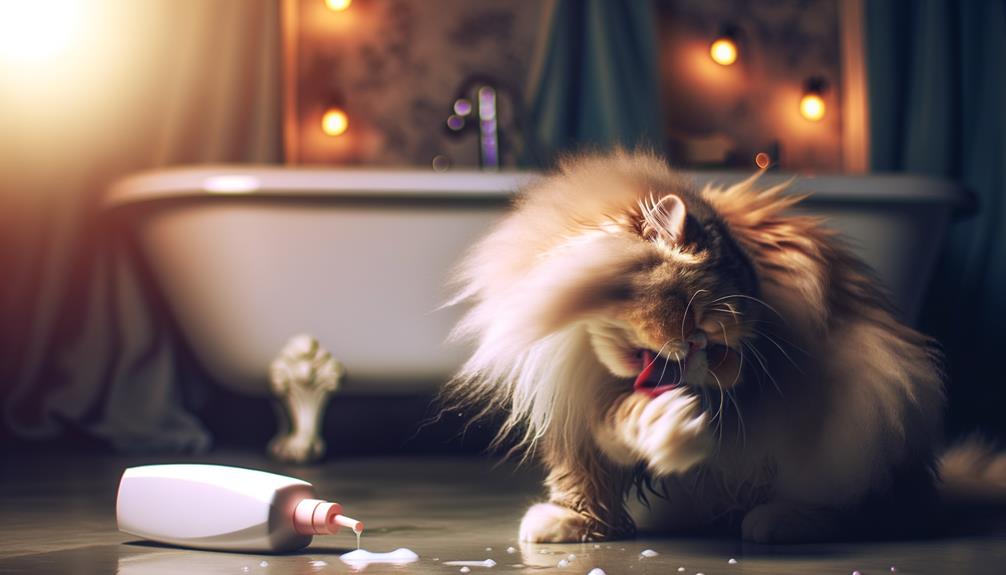You might wonder why your cat immediately starts licking itself after a bath. It's not just about getting dry. There's a fascinating combination of instinctual behaviors at play. From restoring their natural scent to redistributing oils, cats have their own reasons for this meticulous grooming process. They also find it quite soothing, easing the stress from what's often a traumatic experience for them. Curious about how these habits contribute to their overall well-being and comfort? Let's uncover the intriguing details behind this behavior.
Restoring Natural Scent
After a bath, cats lick themselves to restore their natural scent, a process fundamental for social recognition and territorial comfort. This behavior is essential as it eliminates any unfamiliar scents introduced during the bathing process. When cats groom, they are fundamentally re-establishing their identity within their environment. By doing so, they guarantee that their familiar scent markers are reinstated, which is critical for their social interactions and territory marking.
The act of cat grooming goes beyond just scent restoration. Cats' tongues function as natural brushes, equipped with tiny, hook-like structures called papillae. These papillae allow cats to clean their fur meticulously, guaranteeing that their natural oils are evenly distributed across their coat. This not only helps in maintaining their distinct scent but also contributes to a healthy and shiny fur appearance.
Furthermore, grooming serves as a calming mechanism for cats. The process of licking and grooming post-bath helps reduce any stress or anxiety induced by the bathing experience. When cats groom, it stimulates the release of endorphins, which have a soothing effect. This self-soothing behavior is an integral part of their overall well-being.
Removing Residual Moisture
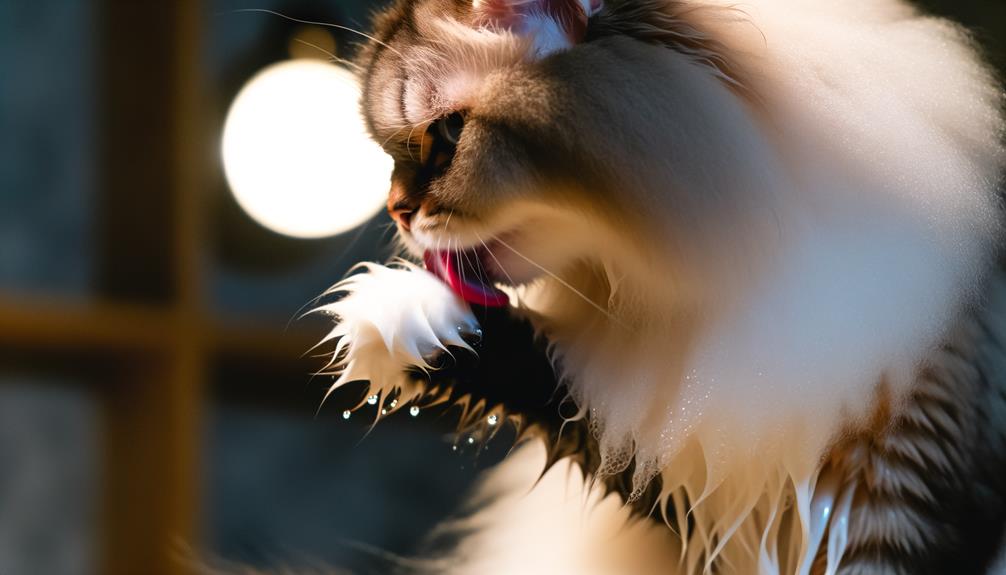
When your cat licks itself after a bath, it's primarily working to remove residual moisture from its fur. This behavior not only helps alleviate discomfort from wet fur but also promotes the evaporation of saliva, aiding in temperature regulation. Additionally, licking helps restore the cat's familiar scent and redistributes natural oils, ensuring a healthy and shiny coat.
Evaporation Through Grooming
Grooming plays an essential role in the evaporation process, allowing cats to effectively remove residual moisture from their fur after a bath. When cats lick themselves, their grooming action is not just about cleanliness; it's a vital mechanism to aid evaporation. By spreading saliva, they create a thin layer over their fur, which facilitates faster moisture loss. This process is essential for regulating their body temperature and ensuring their comfort post-bath.
Evaporation through grooming is a sophisticated behavior rooted in instinct. As cats lick their fur, the saliva they deposit helps to evaporate the water more efficiently. This is significant because wet fur can lead to a sensation of chill, negatively impacting their body temperature regulation. By enhancing evaporation, cats can more swiftly shift from a damp state to a dry one, mitigating any potential thermal discomfort.
Additionally, this grooming behavior helps restore the cat's familiar scent, which is important for their psychological comfort and security. The combination of physical and olfactory benefits underscores why grooming is such an intrinsic part of a cat's post-bath routine. Therefore, the act of licking serves multiple essential functions, all contributing to the cat's overall well-being.
Discomfort From Wet Fur
For cats, the discomfort from wet fur after a bath is a significant issue that drives their instinctual grooming behavior. When your cat's fur is wet, it causes an immediate sense of unease, prompting them to engage in self-grooming. This behavior is critical for redistributing saliva across their coat, aiding in the evaporation of excess moisture. The mechanical action of licking not only removes water but also any residual shampoo or soap, which, if left unattended, could irritate their skin.
Self-grooming is a multifaceted response to the discomfort from wet fur. By stimulating blood flow through repetitive licking, your cat helps regulate its body temperature, which can be thrown off balance by the cooling effect of wet fur. Additionally, the act of grooming allows your cat to restore its natural scent, which may be altered by the bath. This restoration of their familiar scent is a secondary benefit, though the primary goal remains the alleviation of immediate physical discomfort.
Restoring Familiar Scent
After addressing the immediate discomfort from wet fur, cats engage in further grooming to restore their familiar scent and remove any residual moisture. This behavior is instinctual and crucial for their well-being. By licking their fur, cats reapply natural oils that are necessary for maintaining a healthy and shiny coat. These oils are distributed evenly across their fur, contributing to an ideal condition.
Licking also serves to eliminate residual moisture, ensuring that their fur is dry and comfortable. This is particularly important because lingering dampness can lead to skin irritations or infections. Furthermore, the act of grooming aids in reinforcing their individual scent. Cats have scent glands located in their skin, and by licking, they disseminate their unique scent throughout their fur. This is essential for territory marking and personal identification, both of which play a significant role in social interactions and recognition among other cats.
In essence, grooming post-bath allows cats to return to their natural scent, free from the unfamiliar smells of shampoo or bathing products. This multifaceted grooming behavior underscores its importance in maintaining not just physical health but also social and psychological stability.
Redistributing Natural Oils
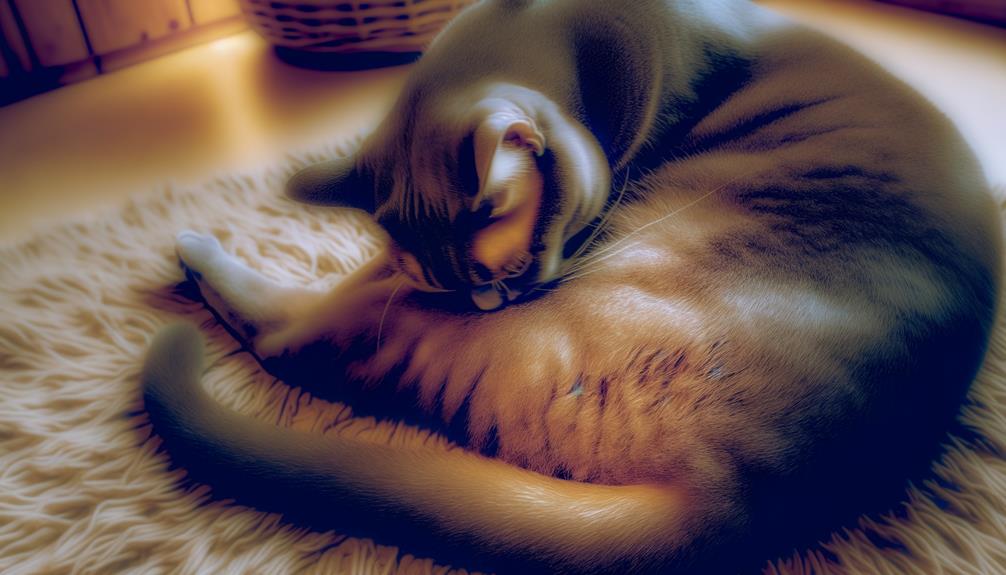
Redistributing natural oils is a significant aspect of why cats lick themselves after a bath. When you bathe your cat, natural oils produced by their skin, known as sebum, can become diluted or washed away. These oils are essential for maintaining the health and shine of your cat's coat. By licking themselves, cats are fundamentally redistributing these natural oils throughout their fur, ensuring that their coat remains moisturized and less prone to skin irritations.
The grooming process itself is highly efficient due to the unique structure of a cat's tongue. It contains tiny, hook-like structures called papillae, which are adept at spreading sebum evenly across the fur. These papillae also help remove any remaining soap residue that might be left on the coat after a bath, further aiding in the prevention of potential skin irritations.
Moreover, licking is not just about restoring moisture; it also creates a protective barrier on the skin. This barrier can help prevent dryness and other skin issues that could arise from a lack of natural oils. The instinctual nature of this behavior underscores its significance in maintaining overall coat health.
Stress Relief Mechanism

While redistributing natural oils is a vital reason for post-bath grooming, another significant factor is stress relief. For a cat, the bathing process can be an anxiety-inducing event. The act of grooming serves as a stress relief mechanism, helping the cat regain a sense of comfort and control. The repetitive action of licking releases endorphins, which are natural chemicals in the brain that promote relaxation and alleviate stress.
When a cat grooms itself after a bath, it's not just cleaning its fur; it's also working to restore its familiar scent. Exposure to unfamiliar scents from shampoos or the bathing environment can disrupt a cat's sense of security and belonging. By grooming, the cat is able to re-establish its personal scent, which is essential for its emotional well-being.
Moreover, licking can serve as a distraction from residual discomfort caused by the bathing process, such as wet fur or skin irritation. This distraction helps the cat focus on something familiar and soothing, thereby reducing stress levels. However, it's significant to mention that stress-induced grooming can become a habitual response if not managed properly. Over time, this can lead to overgrooming behaviors, which may require intervention.
Understanding that grooming acts as a stress relief mechanism for your cat can help you better manage its post-bath behavior. Making certain a calm and comfortable environment during and after the bath can minimize the stress your cat experiences, thereby reducing the need for excessive grooming. Always monitor your cat's grooming habits to guarantee they remain healthy and balanced.
Enhancing Skin Stimulation
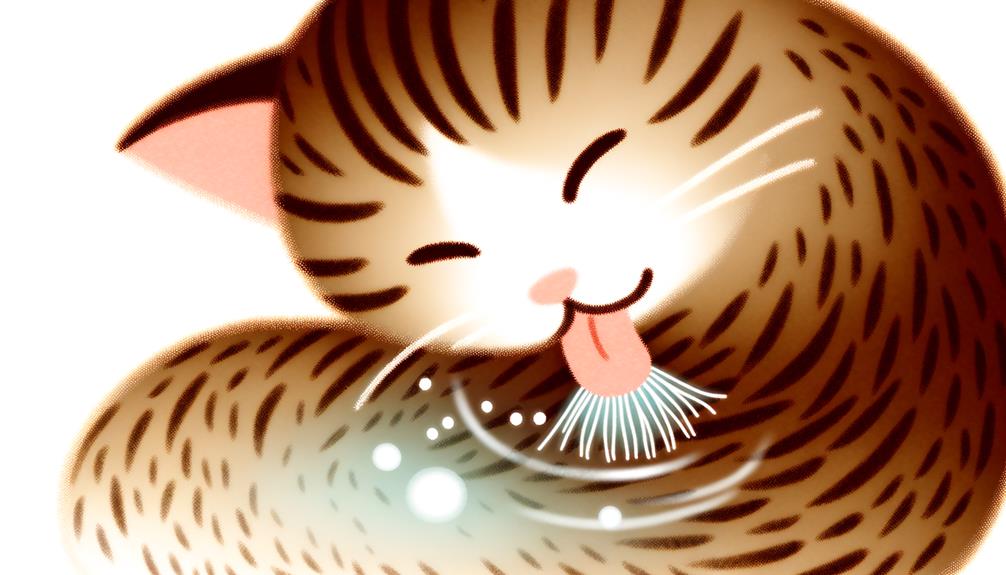
Often, cats lick themselves post-bath to stimulate their skin and enhance blood circulation, which can greatly improve overall skin health. This self-grooming behavior is not merely superficial but serves several physiological functions.
Firstly, licking helps distribute the natural oils produced by the sebaceous glands. These oils are essential for maintaining the sheen and moisture of your cat's fur. When a cat licks its coat, it guarantees that these natural oils are evenly spread, promoting a healthy, glossy appearance.
Secondly, the act of licking acts as a form of massage. This gentle, rhythmic motion can alleviate any irritation or discomfort caused by the bathing process. The stimulation of the skin through licking enhances blood flow, which aids in delivering essential nutrients to the skin cells and can accelerate the healing of minor abrasions or irritations.
Lastly, licking helps remove any residual water from their coat. This is not just for drying purposes but also to further activate the skin and sebaceous glands, assuring they function effectively.
Here's a quick summary of the benefits:
- Distribution of Natural Oils: Keeps fur shiny and well-moisturized.
- Skin Massage: Alleviates irritation and enhances blood circulation.
- Removal of Residual Water: Further stimulates the skin and sebaceous glands.
Re-establishing Comfort

Following a bath, cats instinctively engage in self-grooming to re-establish comfort and restore their natural scent. This behavior is deeply rooted in a cat's instinctual need to maintain its own unique pheromones, which are vital for identifying their territory and themselves. When you bathe your cat, even with the gentlest cat shampoo, it can strip away these familiar pheromones, leaving your feline friend feeling disoriented and uncomfortable.
Self-grooming serves multiple purposes in re-establishing comfort. To begin with, the act of licking helps to remove any lingering shampoo residue and unfamiliar scents from their fur. This is essential for their hygiene and overall sense of well-being. The saliva used during grooming acts as a natural cleanser, aiding in the removal of foreign substances that may remain post-bath.
Additionally, the physical act of grooming stimulates blood flow and can alleviate residual stress or anxiety caused by the bathing process. The rhythmic motion of licking releases endorphins, promoting a sense of calm and relaxation. This can be particularly important immediately following a bath, as the experience itself can be quite stressful for many cats.
Moreover, licking helps cats dry off by using their saliva, which assists in temperature regulation through evaporation. This natural drying process can be more comfortable for cats than being dried with a towel or blow dryer, which can sometimes add to their stress.
Coping With Bath Anxiety
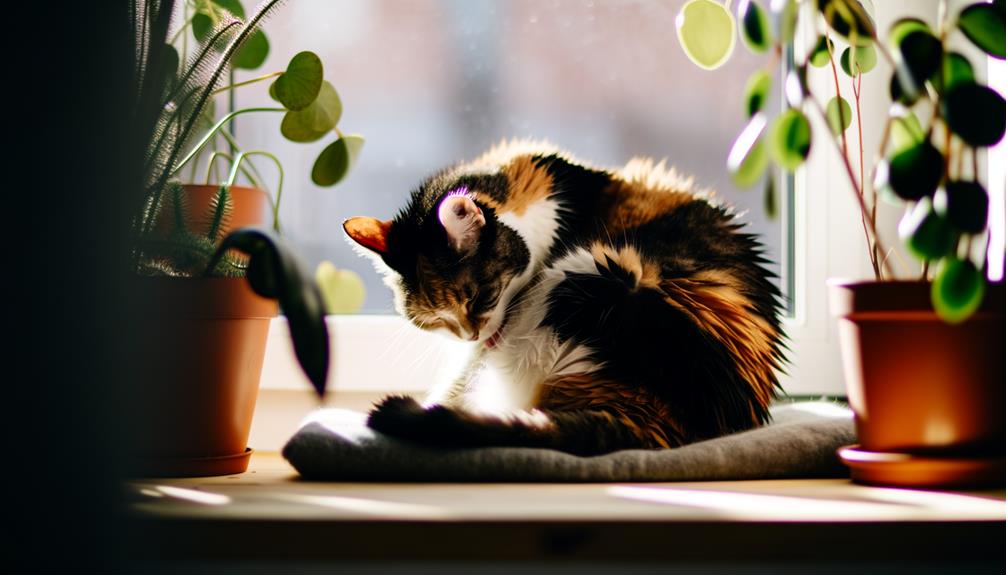
To address your cat's bath anxiety, consider implementing stress reduction techniques such as gradual acclimation to water and using pheromone sprays or calming supplements. Post-bath comfort measures, like providing a warm, quiet space and gentle towel drying, can greatly mitigate distress. These strategies will help your cat associate bathing with positive experiences, ultimately reducing the need for excessive self-grooming.
Stress Reduction Techniques
When faced with the challenge of bathing your cat, it's critical to employ effective stress reduction techniques to mitigate anxiety. A calm demeanor and creating positive experiences are paramount in ensuring a less stressful bath time for your feline companion. Gradual acclimation to water and handling can considerably reduce anxiety, allowing your cat to associate bath time with positive experiences rather than stress.
Here are three key techniques to help reduce your cat's bath-related stress:
- Gradual Acclimation: Slowly introduce your cat to the bathing process. Start with brief exposure to water and gradually increase the duration. This helps desensitize your cat to the bath environment.
- Calm Environment: Create a designated, quiet bathing area free from distractions. A calm setting, combined with a soothing voice, can help your cat feel more secure and relaxed.
- Positive Reinforcement: Use treats and playtime immediately after the bath to create a positive reinforcement loop. This association can help alleviate residual anxiety and make future baths more manageable.
Post-Bath Comfort Measures
After a bath, it's vital to implement post-bath comfort measures to help your cat cope with any residual anxiety. Cats licking themselves is a natural behavior that offers multiple physiological and psychological benefits. By grooming, they effectively remove dander and any lingering shampoo, which could otherwise cause skin irritation or health issues. This self-cleansing action guarantees their skin and fur are free from irritants, promoting ideal coat health.
Licking also redistributes the natural oils throughout their fur, which is important for maintaining a healthy coat. These oils play a considerable role in temperature regulation and overall skin health. Additionally, the act of licking can facilitate evaporation, aiding in the drying process and preventing overheating—a common stress response post-bath.
Moreover, this grooming behavior serves as a self-soothing mechanism. By reintroducing their own scent, cats regain a sense of familiarity and security, mitigating the stress caused by the bathing process. Encouraging this behavior by providing a quiet, comfortable space post-bath can greatly reduce anxiety levels. Making sure your cat feels safe and undisturbed during this time is key to helping them recover from the potentially unsettling experience of being bathed.
